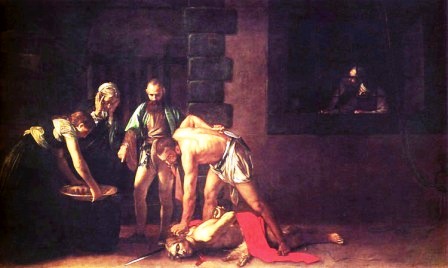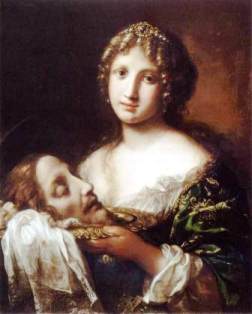 Today is the feast of the Beheading of John the Baptist.
Today is the feast of the Beheading of John the Baptist.
I have always considered this (also) my name day, and in so many ways it is more appropriate for me than the Nativity of John in June.
And since I have – with great pastoral concern for my person and future – been “cancelled” (more than once) the Feast of the Beheading of the Baptist is of even greater significance for me.
 It is also a good occasion for me to thank my benefactors. Without you, dear dear readers,….
It is also a good occasion for me to thank my benefactors. Without you, dear dear readers,….
The date of this feast has its origin in the day of the translation (moving) of relics of the head of the Baptist to the Basilica of San Silvestro in Capite in Rome. Feast days are often fixed on the date of the death of a saint or on the date of the moving of their relics, which we normally term “translation”. The word “translation” makes more sense when you know Latin. It is a compound of trans and fero. Fero has as its other principle parts the perfect tuli and participle latum. So, English “transfer” and “translate” are nearly identical twins.
Here is the Roman Martyrology entry for ” the greatest man born of woman”, as the Lord called him:
Memoria passionis sancti Ioannis Baptistae, quem Herodes Antipas rex in arce Macherontis in carcere tenuit et in anniversario suo, filia Herodiadis rogante, decollari praecepit; ideo, Praecursor Domini, sicut lucerna ardens et lucens, tam in morte quam in vita testimonium perhibuit veritati.
…
The memorial of the suffering and death of St. John the Baptist, whom King Herod Antipas held in the prison in the citadel of Macheron and, on his birthday, since the daughter of Herodias was making the request, ordered to be beheaded; thus, the Precursor of the Lord, like a bright shining lantern, gave witness to the truth in death as much as he did in life.
![]()
There is a tradition that John was forgiven the guilt of Original Sin before He was born, at the sound of Mary’s voice when she came to visit Elizabeth and John leapt in her womb.
St. Augustine spoke often of St. John the Baptist, “the voice” of Christ’s “Word”.
Here is a piece of s. 380, preached in a year we can’t quite figure out. As a matter of fact, it might not be an actual sermon, but something assembled from other pieces. Still, it is Augustinian:
8. So let us recognize these two things in the very differences of [Christ’s and John’s] deaths. We read that John suffered martyrdom for the truth; was it for Christ? It wasn’t for Christ if Christ isn’t Truth. It certainly wasn’t for His Name, and yet it was for Truth itself. I mean the reason John was beheaded, after all, was not that he had confessed Christ. But he was urging self-control, he was urging justice; he was saying, “It is not lawful for you to have your brother’s wife” (Mk 6:18). The law, you see, which had commanded this, had also commanded about those who died without children, that brothers should take the wives of their brothers, and raise up seed for their brothers. Where this reason was lacking, the only motive was lust. It was this lust that John was rebuking, a chaste man rebuking an incestuous one; because this too is what he represented: “It is necessary for him to grow, but for me to diminish” (Jn 3:30).
The commandment had already been given that if anyone died without seed, his closet relation should take his wife and raise up seed for his brother. After all, why had God commanded this if not to signify in this way that the brother’s seed was to be raised up to the brother’s name? The commandment, you see, was that the child to be born would have the name of the deceased. Christ was deceased, the apostles took His spouse, the Church. Those whom they begot of her they did not name Paulians or Petrians, but Christians.
So let both their deaths also speak of these two things: “It is necessary for him to grow, but for me to diminish.” The one grew on the Cross, the other was diminished by the sword. Their deaths have spoken of this mystery, let the days do so too. Christ is born, and the days start increasing; John is born, and the days start diminishing. So let man’s honor diminish, God’s honor increase, so that the honor of man may be found in the honor of God.
Augustine makes the connection between the change of seasons and the births of John the Precursor and Christ the Messiah. Very nice.
In nature, in the northern hemisphere, the days are now quite obviously getting shorter, a cycle reflected in our feasts.
Please pray for me. Ask St. John to stand guard over me and to intercede with his divine Cousin for the graces I am going to need in the future.

 The commandment had already been given that if anyone died without seed, his closet relation should take his wife and raise up seed for his brother. After all, why had God commanded this if not to signify in this way that the brother’s seed was to be raised up to the brother’s name? The commandment, you see, was that the child to be born would have the name of the deceased. Christ was deceased, the apostles took His spouse, the Church. Those whom they begot of her they did not name Paulians or Petrians, but Christians.
The commandment had already been given that if anyone died without seed, his closet relation should take his wife and raise up seed for his brother. After all, why had God commanded this if not to signify in this way that the brother’s seed was to be raised up to the brother’s name? The commandment, you see, was that the child to be born would have the name of the deceased. Christ was deceased, the apostles took His spouse, the Church. Those whom they begot of her they did not name Paulians or Petrians, but Christians.































A relevant post from the Society of St. Hugh of Cluny:
https://sthughofcluny.org/2021/08/a-traditionalist-at-metropolitan-opera-radio.html
The author notes that the feast was observed at one of the many TLM’s still going on in the Diocese of Bridgeport, CT. I don’t recall any mention of it at the TLM I attended, at least not during the homily, and the readings were for the usual Sunday.
Consider it done with regards to praying to St. John the Baptist to stand over you and guide and protect you, especially in the times now and in the future. We pray for you daily, Father.
Praying for you, Father. I myself am in a position where my job is at risk (in part because of Covid) and I too am uncertain what the future will hold.
Praying for you as always Father Z. Thanks for your devotion to our Lord! May St. John the Baptist intercede for you in all ways and entreat our Lord to protect you.
As an aside, my first trip to Istanbul (Constantinople) was in late 2001, following 9/11. Went there for work with the USAF while assigned to NATO. I wanted to see the Hagia Sophia (for the architecture as I wasn’t as into my faith as I am now) so I went with a Turkish officer who was a friend of mine. We visited the Ataturk museum located with the Hagia Sophia. They had lots of looted reliquaries taken by the Muslims when they sacked Constantinople. One or the reliquaries had a piece of the skull of John the Baptist as well as a forearm of St. Paul, but I digress. First relic I had ever seen in my life. Very striking and very simple at the same time. I appreciate it all the more now.
May God continue to bless your good and necessary work Father.
Fr. Z, I pray for you everyday. I ask our Blessed Mother under the title Queen of Clergy and St. Joseph patron of the universal church to watch over you and protect you. I will now add your namesake, St. John the Baptist, to this list.
Each day I remind myself that in Our Lord’s own hand-picked group of twelve, there was a traitor, Judas. Today we are surrounded by traitors in our church, in our country and in the world.
The evil demons and unclean spirits, the corruption and crime that we see today on an unprecedented level are hard to understand. It is overwhelming and depressing. It seems like there is nothing to hold onto in this world anymore.
Each day I meditate on the sufferings of Our Lord and what He went through, what corruption and crime did to Him, and by His own people. It is well documented what was done to Him, but I find it impossible to even imagine what He went through. Man’s inhumanity to man.
But, what I do hold onto is Our Lord’s promise to send the Holy Spirit to lead us into all truths and that the gates of Hell will not prevail against his church. Hang in there Fr. Z, we love you.
I am praying for you. May God bless you abundantly for the good you do, may Mary protect you with her motherly care always, may St. Joseph provide for you everything you need and may St. John intercede in a special way for you now and each day of your life!